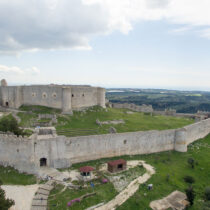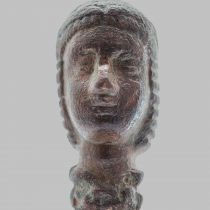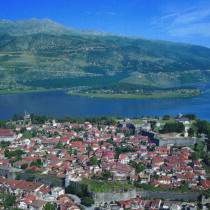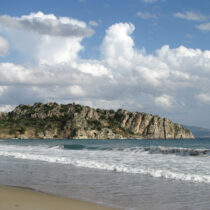Unlocking the secrets of the Ancient Coastal Maya
Jeffrey Glover shares what he’s learned about the people who lived in Quintana Roo Mexico over a span of 3,000 years.
Magnificent 1700-year-old mosaic returns home to Lod, Israel
New visitors’ center to display a breathtaking mosaic some 1,700 years old and among the world’s most beautiful.
Standing Bear’s tomahawk returned to the Ponca Tribe
The return of the pipe-tomahawk marks increased efforts from the Peabody Museum to return tribal artifacts to their tribes of origin.
2000-year-old human remains and animal sacrifices found in Dorset
Archaeology students from Bournemouth University have found the remains of prehistoric people and animal sacrifices in a recently discovered Iron Age settlement in Dorset.
Onassis Stegi presents a mural by Aristides Lappas in Omonoia
The Onassis Stegi presents a mural by the up-and-coming visual artist Aristeidis Lappas: a new, colorful Athena for a new, multicultural Athens.
(Im)Migrants and Democracies: Ancient and Modern
The volume aims to explore perceptions and aspects of (im)migration during the Archaic, Classical, and Hellenistic periods.
After Hellas – Santiago Calatrava in the Glyptothek
The Glyptothek presents the first exhibition devoted exclusively to the sculptural and painting works of renowned architect Santiago Calatrava.
Research into grave goods sheds new light on traditional roles
Research into grave goods and skeletal material shows that male-female roles 7,000 words ago were less traditional than was thought.
Human bones used for making pendants in the Stone Age
Human bones were used as a raw material for pendants, as demonstrated by a study of burial finds dating back over 8,200 years.
From Thermopylae and Granicus to Afghanistan and Ukraine
The International Symposium will take place in the Garden of the Archaeological Museum of Sparti.
George Kordis – “The Uprooted: Refugees”
A large-scale installation on the theme of uprootedness and the experience of refugees as a socio-historical phenomenon, tracing its existential, psychological and humanitarian aspects.
A multidisciplinary approach regarding the analyses of wine amphorae
Chemist Louise Chassouant of Avignon University and her colleagues investigated the pitch used for coating three 1,500-year-old Roman amphorae from San Felice Circeo.
British Academy Post-Doctoral Fellowships and Research
The Classics Faculty welcomes enquiries from potential applicants for a range of post-doctoral programmes.
Archaeologists carry out first dig at tomb linked to King Arthur
Archaeologists from The University of Manchester have started a dig at a 5,000-year-old tomb linked to King Arthur, hoping to answer some of the mysteries surrounding the enigmatic site in the process.
Dogs came from two different populations of wolves
An international group of geneticists and archaeologists, led by the Francis Crick Institute, have found that the ancestry of dogs can be traced to at least two populations of ancient wolves.
A European Cultural Heritage mark to Ancient Nemea
The opening of the Nemean Games, the seventh event in the history of the revival of the ancient Panhellenic Games, was declared by Lina Mendoni.
New finds from the ancient cemeteries of Milos
The Cyclades Ephorate of Antiquities has designed and mounted a new archaeological exhibition in the foyer of the island’s renovated museum.
Monument of Episkopi, Sikynos, Greece wins European Heritage Award
Among this year’s winners is the Monument of Episkopi in Sikinos, Greece, in the category Conservation and Adaptive Reuse.
Romans brought mules with them
Genetic analyses by an international team involving researchers from the LMU and the State Collection show that the Romans were the first to bring mules to Central Europe.
Archaeology of Transformation: Changing Scapes
Here is the CFP for an upcoming TAG (Theoretical Archaeology Group)
workshop.
Bridging the Gaps: Interconnective Approaches to the Ancient World
This hybrid conference welcoms papers from student and early career researchers engaging with the ancient world of the Mediterranean.
The bronze inscribed tablets of Argos at the Epigraphic Museum
The tablets that came to light in 2000-2001 on a plot of land in Argos are part of the financial archive of the city.
Australia’s first marine Aboriginal archaeological site questioned
A new study from The University of Western Australia has challenged earlier claims that Aboriginal stone artifacts discovered off the Pilbara coast in Western Australia represent Australia's first undisturbed underwater archaeological site.
The restored part of the ancient theatre of Dodona opened to the public
The restored lower part of the auditorium/koilon of the ancient theatre of Dodona was opened to the public on Tuesday, June 21, World Music Day, with a big concert by the Boston Philharmonic Youth Orchestra.




























